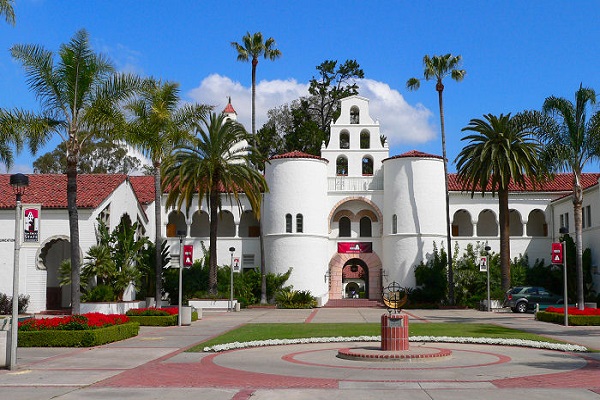San Diego State University Mission Valley To Get First Affordable Housing Project
San Diego State University has selected Chelsea Investment Corporation (“Chelsea”) to develop the first affordable housing project at SDSU Mission Valley.
Chelsea, a development firm known for environmentally sustainable, transit-oriented, high-quality affordable housing, will deliver 182 units in a first phase of multifamily housing to a population with incomes averaging 50 percent of the area median. The project will also include a state-of-the-art child care center, and a culturally rich space complete with public art on the building facades.
The project will consist of 1-bedroom, 2-bedroom, 3-bedroom and 4-bedroom units, in a high-quality, aesthetically pleasing affordable community with landscaped courtyards and welcoming gathering spaces. Given the proximity of the Stadium Station trolley stop, the project will be designed around transit-oriented commuting to help minimize the need for driving and parking, and to include on-site bicycle storage.
Upon successful execution of the first phase, Chelsea would deliver a second phase of 109 units.
By introducing affordable units early on, the university is making a commitment to help low-income individuals and families. Upon project completion of both phases, SDSU Mission Valley will deliver more than half of its committed 460 affordable housing units.
“SDSU has always been committed to the inclusion of affordable housing on-site at Mission Valley,” said Gina Jacobs, Associate Vice President, Mission Valley Development. “In partnership with Chelsea, which has strong experience and success in developing similar projects, we are taking a big step toward fulfilling our long-standing commitment.”
Chelsea is a fully integrated for-profit affordable housing developer in San Diego County with construction and asset management affiliate companies. Chelsea brings its vast experience to help SDSU achieve its vision for SDSU Mission Valley. Chelsea has developed approximately two-thirds of similar, inclusionary housing in San Diego County over the last 20 years — nearly twice as many units as all of its competitors combined.
“It is a great honor for our team to be selected to develop the first affordable housing community at SDSU Mission Valley,” said Cheri Hoffman, President of Chelsea Investment Corporation. “We have watched the initial transformation of the former Stadium site and look forward to being a partner on this redevelopment effort which will be an asset to our community for years to come. Chelsea welcomes the opportunity to help bring relief to the current housing crisis and provide families with access to safe and reliable child care. We are eager to truly be a part of the team that will bring the vision of SDSU Mission Valley to life.”
Committed to benefiting the broader Mission Valley community, Chelsea also plans to include an on-site, state-of-the-art child care facility. The 6,220-square-foot facility will support up to 70 preschool and Pre-K children.
The child care center will be operated by Episcopal Community Services (ECS), a local nonprofit organization that provides early childhood development and education programming to 1,800 families and therapeutic support to 400 children and families. The ECS team creates positive, welcoming, and inclusive environments where children learn, grow, and connect with each other and their teachers.
“At SDSU Mission Valley, we envision a child care center that is truly vibrant, diverse, and inclusive, welcoming children from the affordable housing units, while also making space available for families in the broader community,” said ECS Chief Executive Officer Elizabeth Fitzsimons.
Paying homage to San Diego’s rich cultural history, Chelsea will commission public art to personalize the neighborhood and create a unique sense of identity. Local artists will incorporate art within the outdoor space and the public garden, as well on the building exterior and throughout the perimeter pedestrian path.
Other on-site residential amenities include a community resource room with integrated electrical and USB outlets to empower residents to work from home; a media center and computer lab; laundry facilities; outdoor lounge spaces with barbecue and dining areas; a bike storage room with a bike repair station; electric vehicle charging stations; and pet-friendly policies.
To create a thriving, sustainable community, Chelsea has identified a path to achieve LEED Gold Certification, including strategies to increase efficiency, optimize systems, and expedite compliance with green building codes and certification program requirements. The buildings will be designed with rooftop solar panels to provide renewable energy and lower utility costs. Interior spaces, including the living units, will have large windows allowing for natural daylighting. The Chelsea project follows the lead of SDSU Mission Valley which is designed to achieve LEED Neighborhood Development and Snapdragon Stadium which was designed to achieve LEED Gold.
The announcement of Chelsea follows the university’s selection of LPC West to begin development on the first project of the innovation district and Avalon Bay to develop the first residential and retail project, which is being designed to achieve LEED Gold.
SDSU Mission Valley is currently constructing the river park, which is scheduled to be completed at the end of the year.
At full build out, SDSU Mission Valley will include 80 acres of parks and open space, up to 4,600 market-rate and affordable housing units, 1.6 million sq. ft. of research and innovative space, 90,000 sq. ft. of retail space, and a hotel.

